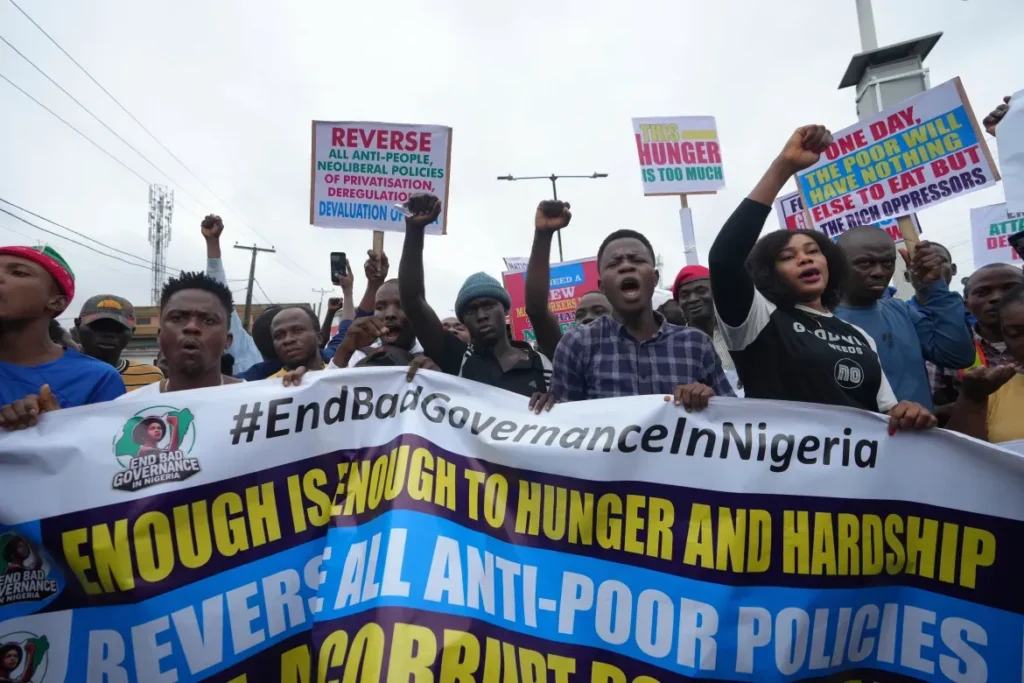In Summary
• Thousands protest across Nigeria against high living costs and economic hardship
• Police use tear gas to disperse demonstrators in Abuja and Kano
• Protesters in Kano set fires and ransack government property
• Peaceful march of 1,000 people reported in Lagos
KANO, NIGERIA– In a nationwide display of public discontent, thousands of Nigerians took to the streets on Wednesday to protest against the rising cost of living and what they perceive as economic mismanagement by the government.
The demonstrations, which swept through major cities including Abuja, Kano, and Lagos, were met with a forceful response from security forces in some areas, leading to clashes and arrests.

The protests, organized under the hashtag #EndbadGovernanceinNigeria, gained traction through social media campaigns.
Demonstrators expressed their frustration with soaring inflation, which has reached 40% for food prices, and fuel costs that have tripled since last year.

These economic pressures have intensified following President Bola Ahmed Tinubu’s decision to end fuel subsidies and liberalize the currency more than a year ago, measures intended to bolster the economy but which have led to immediate hardship for many Nigerians.
In Kano, Nigeria’s second-largest city, the situation escalated as protesters set fire to tires outside the state governor’s office.
Police responded by firing tear gas to disperse the crowd. The unrest intensified when demonstrators torched and ransacked a digital center belonging to the Nigeria Communications Commission. Law enforcement reported incidents of looting and arson throughout the city, resulting in 13 arrests.
The capital, Abuja, saw similar scenes of confrontation. Security forces blockaded roads leading to Eagle Square, a planned protest site, and used tear gas to prevent several hundred demonstrators from gathering.

The crackdown extended to Mararaba on the outskirts of Abuja, where tear gas was also deployed to disperse crowds.
In contrast, Lagos, the country’s economic hub, witnessed a more peaceful demonstration. Approximately 1,000 people marched through the mainland area, chanting “Tinubu Ole” – a Yoruba phrase labeling the president a “thief.” This peaceful assembly highlighted the varied nature of the protests across the country.

The nationwide demonstrations also reached other cities, with local media reporting hundreds of protesters in Maiduguri, Bauchi state, and several other regions. The widespread nature of the protests underscores the depth of discontent among Nigerians facing economic hardship.
Many protesters cited hunger and inability to provide for their families as primary motivations for joining the demonstrations. Jite Omoze, a 38-year-old factory worker in Kano, expressed the desperation felt by many: “We are hungry – even the police are hungry, the army are hungry. I have two children and a wife but I can’t feed them anymore.”

The government had previously warned against attempts to replicate the recent violent demonstrations in Kenya, where protesters forced the abandonment of new taxes.
However, the economic pressures in Nigeria, exacerbated by Tinubu’s policies aimed at long-term economic improvement, have proven too severe for many to bear silently.
As Nigeria grapples with these domestic challenges, the international community watches closely.
The coming days will be crucial in determining whether the government can address the protesters’ concerns and stabilize the volatile situation across the nation.
https://www.africanexponent.com/live-bullets-fired-at-protesters-as-nigerians-protest-soaring-living-costs-and-bad-governance/


